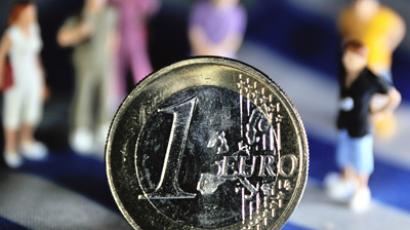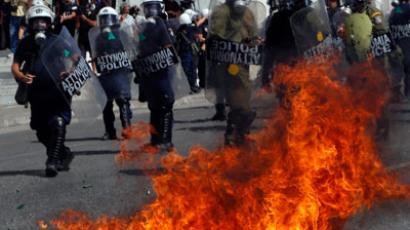Athens police fire tear gas in crackdown clashes at anti-Merkel protest (VIDEO)
Police fired tear gas as angry protesters clashed with officers in Athens as thousands rallied in the Greek capital in protest against German Chancellor Angela Merkel’s visit. Merkel is in Athens for austerity talks with the country's Prime Minister.
Angry protesters picked stones from the cracked pavement and hurled them at police, who responded with tear gas, pepper spray and stun grenades. AFP estimated that at least 25,000 people turned out to express their anger at Greece’s austerity policies.Demonstrators hoisted banners reading, “Merkel out, Greece is not your colony” and “This is not a European Union, it's slavery.”Teachers, doctors and other public employees went on strike Tuesday, taking to the streets of Athens alongside trade unions and opposition political parties. Many Greeks say they cannot take more of the wage cuts and tax hikes that have left every fourth person in the public sector jobless.“They've turned our lives into hell,” one the protesters told Reuters. “We don't want [Merkel] here.” Two Nazi flags were set on fire near parliament as demonstrators chanted, “No to the Fourth Reich!”The rallies were mostly peaceful, but police briefly clashed with several dozen demonstrators. Around 200 people were detained in Athens, including students and members of a ‘Solidarity Network’ protest bloc.
As protesters raged in the streets, Greek PM Antonis Samaras welcomed his “friend” Angela Merkel. After talks with Samaras, Merkel said that the EU country “has done a lot, but much remains to be done.” Merkel vowed that she wanted Greece “to remain in the euro.” Samaras responded by saying that Greeks were “bleeding,” but would stick with their austerity program and were likewise determined to stay in the eurozone. Merkel’s trip to Athens lasted six hours.
Merkel is seen as the representative of economic aggression against Greece, Panagiotis Sotiris, a sociology lecturer from the University of the Aegean told RT. “What happened today in Athens – these demonstrations we witnessed – were just something like a message that we are going to see much more protests and anger in Greece,” he said. “We are in the fifth year of recession. We are in the third year of austerity measures. And they are asking us for even harder austerity measures.”And the Greek government has not even made public what the new austerity package will include, Sotiris noted.“The actual cuts have not yet been announced,” he said. “They are going to announce them in the coming days; they will have to put them through parliament. This is going to see days of protests, days of strikes.”
Authorities issued permits for only two of the planned protests. At least 7,000 police from across the country were deployed in Athens, including rooftop snipers, water cannons and hundreds of undercover agents. Security forces erected steel fences around the capital’s parliament building.Locals said that snipers were stationed on the roof tops of government buildings in Athens, and that commando units were also seen on standby as helicopters patrolled the skies over Athens.
“It will be one of the biggest security drills in recent years,” said a senior police official who chose to remain anonymous. These extreme measures are being put in place because Merkel's brief visit comes amid growing unrest in Greece over new cutbacks.Greek authorities, who are struggling to talk bailout creditors into unfreezing a vital loan installment, appear determined to prevent riots whilst Merkel is in town.Public Order Minister, Nikos Dendias, called on protesters to "protect the peace, and above all our country's prospects and our international image."
Greece has depended on bailouts from fellow EU member states and the International Monetary Fund since May 2010. To get the loans, it implemented a series of deep income cuts and tax hikes, while increasing retirement ages and facilitating private sector layoffs.However, Greece must axe another $17.5 billion over the next two years to qualify for its next rescue loan payment – without which the government will run out of cash next month.Germany has provided most of the EU’s bailout fund – but has also remained one of Greece’s toughest critics, demanding more reforms from the Greeks to keep their economy solvent. Tensions ahead of the visit are already simmering in the Greek capital, with thousands gathering in front of the parliament building in Syntagma Square, chanting against fresh budget cuts and burning an EU flag.More than 8,000 protesters vented their frustration at German Chancellor Angela Merkel, who they see as an instigator of their crippling reform program.














